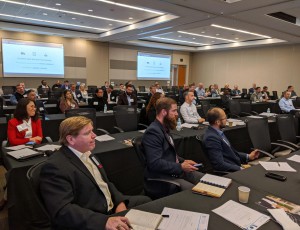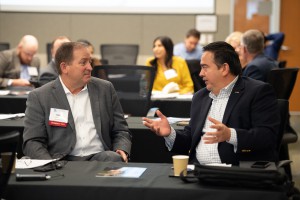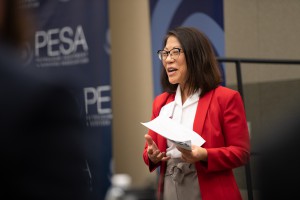 The 2020 PESA Supply Chain Conference included key operators who addressed how digital culture and transformation as well as blockchain can impact supply chain logistics, inventory and change management within the oil and gas industry.
The 2020 PESA Supply Chain Conference included key operators who addressed how digital culture and transformation as well as blockchain can impact supply chain logistics, inventory and change management within the oil and gas industry.
PESA Board Member Chuck Chauviere, President, Drilling Systems, Baker Hughes, and PESA Supply Chain Committee Chair Hope Anderson, Vice President, Supply Chain, NOV, welcomed participants to the conference held February 19 at Baker Hughes.
Shawn Maxson, Strategy & OFSE Leader, Deloitte, opened with a market outlook citing slower demand growth, abundant supply and uncertainty as driving forces on productivity and returns. Relative to the long-term market forecast, Maxson highlighted the changing global energy mix through 2050, indicating renewables will capture a majority of the demand while fossil fuels will be relatively flat. When looking at 2020 forecasted expenditures, international spending expected to grow 4-5%, with North America expenditures continuing to decline due to continued pricing pressure.
 Based on the data, Maxson said he expects oil prices and OFS sector revenues to rebound but earnings to not improve, resulting in profitability pressure. To drive significant improvements, the OFS sector needs to focus on five levers: portfolio strategy, operating models, commercial approach and pricing, integrated business planning and internal digital solutions.
Based on the data, Maxson said he expects oil prices and OFS sector revenues to rebound but earnings to not improve, resulting in profitability pressure. To drive significant improvements, the OFS sector needs to focus on five levers: portfolio strategy, operating models, commercial approach and pricing, integrated business planning and internal digital solutions.
Lastly, Maxson focused on the supply chain implications of digital transformation. He noted digital supply chain capability will be a key driver of productivity and efficiency improvement across the value chain and will accelerate end-to-end value.
[su_quote cite=”Shawn Maxson, Deloitte”]“We view this as a different world that is interconnected and requires a much higher level of collaboration across the value chain. Having digital supply chain capabilities, such as complete visibility to operations at a well site, would have a tremendous impact upon efficiency as an industry.”[/su_quote]
 Keynote speaker Greg Leveille, CTO, ConocoPhillips, addressed using data analytics and emerging digital technologies to navigate disruptive changes in the oil and gas industry.
Keynote speaker Greg Leveille, CTO, ConocoPhillips, addressed using data analytics and emerging digital technologies to navigate disruptive changes in the oil and gas industry.
Leveille began by sharing oil and natural gas production numbers, citing how production from unconventional reservoirs has rejuvenated the U.S. oil industry. Globally, he showed the top producers of hydrocarbons, most with modest growth and the U.S. being the largest producer over the past several decades.
Alongside surging oil and gas production in the U.S., there is also an increase in atmospheric CO2 and methane levels.
[su_quote cite=”Greg Leveille, ConocoPhillips”]“This is a world that E&P and oilfield service companies need to be prepared to work in over the next several decades. Not only is it well-supplied, but there are increasing levels of greenhouse gases in the atmosphere.”[/su_quote]
 Leveille said ConocoPhillips is focused on two strategic technology and innovation objectives designed to reduce supply costs and greenhouse gas emissions – data analytics and emerging digital technologies critical for improving performance. Strategies around upskilling the workforce, working with universities to train incoming students, pairing data scientists with subject matter experts and working with high-tech firms and industry consortiums are all playing an increasingly important role.
Leveille said ConocoPhillips is focused on two strategic technology and innovation objectives designed to reduce supply costs and greenhouse gas emissions – data analytics and emerging digital technologies critical for improving performance. Strategies around upskilling the workforce, working with universities to train incoming students, pairing data scientists with subject matter experts and working with high-tech firms and industry consortiums are all playing an increasingly important role.
“We’re looking at oilfield service providers as well to find out how do we work with you to provide products that have the digital capabilities that allow us to be more successful going into the future,” Leveille said.
 Mark Zorbas, Principal, Heidrick & Struggles, provided insight on how digital transformation relates to organizational change and the challenges companies can often face.
Mark Zorbas, Principal, Heidrick & Struggles, provided insight on how digital transformation relates to organizational change and the challenges companies can often face.
“Some of the biggest hurdles to accelerating value from a digital transformation are the human elements – leaders, teams and culture,” Zorbas said.
H&S global research compared how companies are performing vs. their peers in the areas of innovation and digital transformation and found four key elements of the best performers: mobilize, execute, transform and agility. The most successful companies were able to spot opportunities and threats and gain competitive advantage by adapting and pivoting faster than peers. Leaders, teams and organizations who collaborate in these efforts gain an advantage.
Zorbas closed by explaining how creating an innovative and agile culture starts with leadership, and he shared critical success factors for driving organizational change.
[su_quote cite=”Mark Zorbas, Heidrick & Struggles”]“It’s important for leadership to have genuine buy-in and alignment. It sends a message to the teams within the organization on how they will work cross-functionally.” [/su_quote]
 Raquel Clement, Global Production Operation Services Category Manager, Chevron, provided an overview on innovations in blockchain relative to digital transformation. She stressed the importance of understanding that digital transformation is not about just digitizing the current process or adding new technologies on top of legacy systems or processes, but rather it can transform how we work, across processes, people and technologies.
Raquel Clement, Global Production Operation Services Category Manager, Chevron, provided an overview on innovations in blockchain relative to digital transformation. She stressed the importance of understanding that digital transformation is not about just digitizing the current process or adding new technologies on top of legacy systems or processes, but rather it can transform how we work, across processes, people and technologies.
[su_quote cite=”Raquel Clement, Chevron”]“Imagine the amount of data we get when we integrate Internet of Things and automation into our businesses,” Clement said. “We need to make sure the data is legitimate, it’s coming from the right sources, there’s no hacking or disruption of the data. This implies a lot of the ways we are working will have to change.” [/su_quote]
Clement shared details on a case using blockchain as part of a solution to enhance the water hauling truck ticketing process in a pilot program. Using blockchain helped take a fragmented process and transform it by making the data digital and validating it using digital sources of truth.
“Blockchain is more than truck ticketing,” Clement said. “Blockchain is going to transform the way we do a lot of things and we need to start thinking about how we as an industry are going to start to shape it.”
Speakers participated in an interactive panel discussion moderated by PESA Supply Chain Committee member Chika Kekeocha, Executive-Global Supply Chain, Baker Hughes. Measuring capabilities and results around digitalization, sustaining momentum and tangible solutions were themes each panelist discussed and will continue to focus on in the future.
THANK YOU TO OUR SPONSOR
[gdlr_button href=”https://energyworkforce.org/archives/2020-supply-chain-conference-a-digital-journey-through-supply-chain/” target=”_self” size=”medium” background=”#3d90c7″ color=”#ffffff”]PHOTO GALLERY[/gdlr_button]




